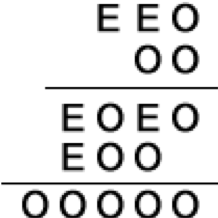Problems
Decode this rebus: replace the asterisks with numbers such that the equalities in each row are true and such that each number in the bottom row is equal to the sum of the numbers in the column above it.
Decipher the following rebus. Despite the fact that only two figures are known here, and all the others are replaced by asterisks, the question can be restored.
48 blacksmiths must shoe 60 horses. Each blacksmith spends 5 minutes on one horseshoe. What is the shortest time they should spend on the work? (Note that a horse can not stand on two legs.)
There are 6 locked suitcases and 6 keys for them. It is not known which keys are for which suitcase. What is the smallest number of attempts do you need in order to open all the suitcases? How many attempts would you need if there are 10 suitcases and keys instead of 6?
Decipher the following rebus

All the digits indicated by the letter “\(E\)” are even (not necessarily equal); all the numbers indicated by the letter \(O\) are odd (also not necessarily equal).
A kindergarten used cards for teaching children how to read: on some, the letter “MA” are written, on the rest – “DA”. Each child took three cards and began to compose words from them. It turned out that the word “MAMA” was created from the cards by 20 children, the word “DADA” by 30 children, and the word “MADA” by 40 children. How many children all had 3 of the same cards?
James spent the first Tuesday of some month in Liverpool and the first Tuesday after the first Monday he spent in Newcastle. In the next month, James spent the first Tuesday in Dover and the first Tuesday after the first Monday he spent in Bristol. Could you determine the dates (day and month) spent by James in each of the cities?
A schoolboy told his friend Bob:
“We have thirty-five people in the class. And imagine, each of them is friends with exactly eleven classmates...”
“It cannot be,” Bob, the winner of the mathematical Olympiad, answered immediately. Why did he decide this?
Cowboy Joe was sentenced to death in an electric chair. He knows that out of two electric chairs standing in a special cell, one is defective. In addition, Joe knows that if he sits on this faulty chair, the penalty will not be repeated and he will be pardoned. He also knows that the guard guarding the chairs on every other day tells the truth to every question and on the alternate days he answers incorrectly to every question. The sentenced person is allowed to ask the guard exactly one question, after which it is necessary to choose which electric chair to sit on. What question can Joe ask the guard to find out for sure which chair is faulty?
Fred and George are twin brothers. One of them always tells the truth, and the other always lies. You can ask only one question to one of the brothers, to which he will answer “yes” or “no”. Try to find out the name of each of the twins.